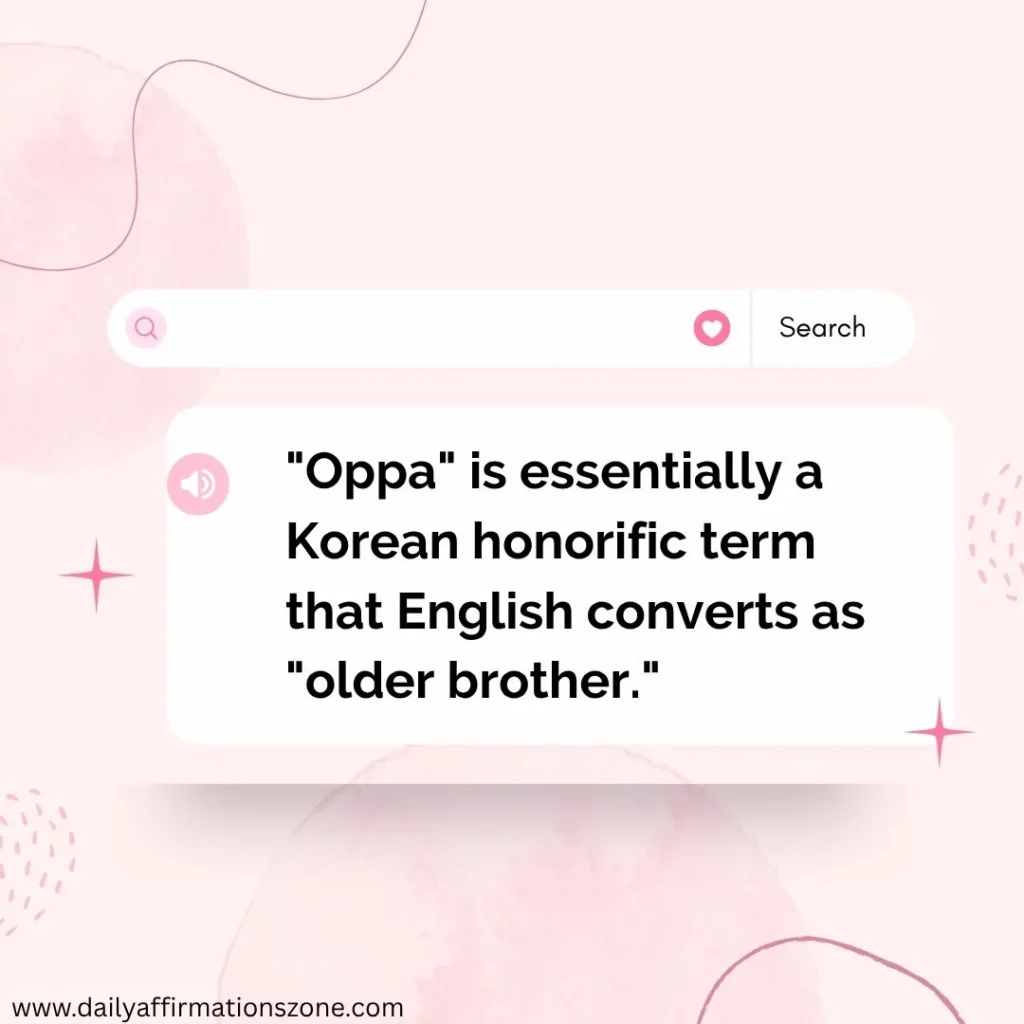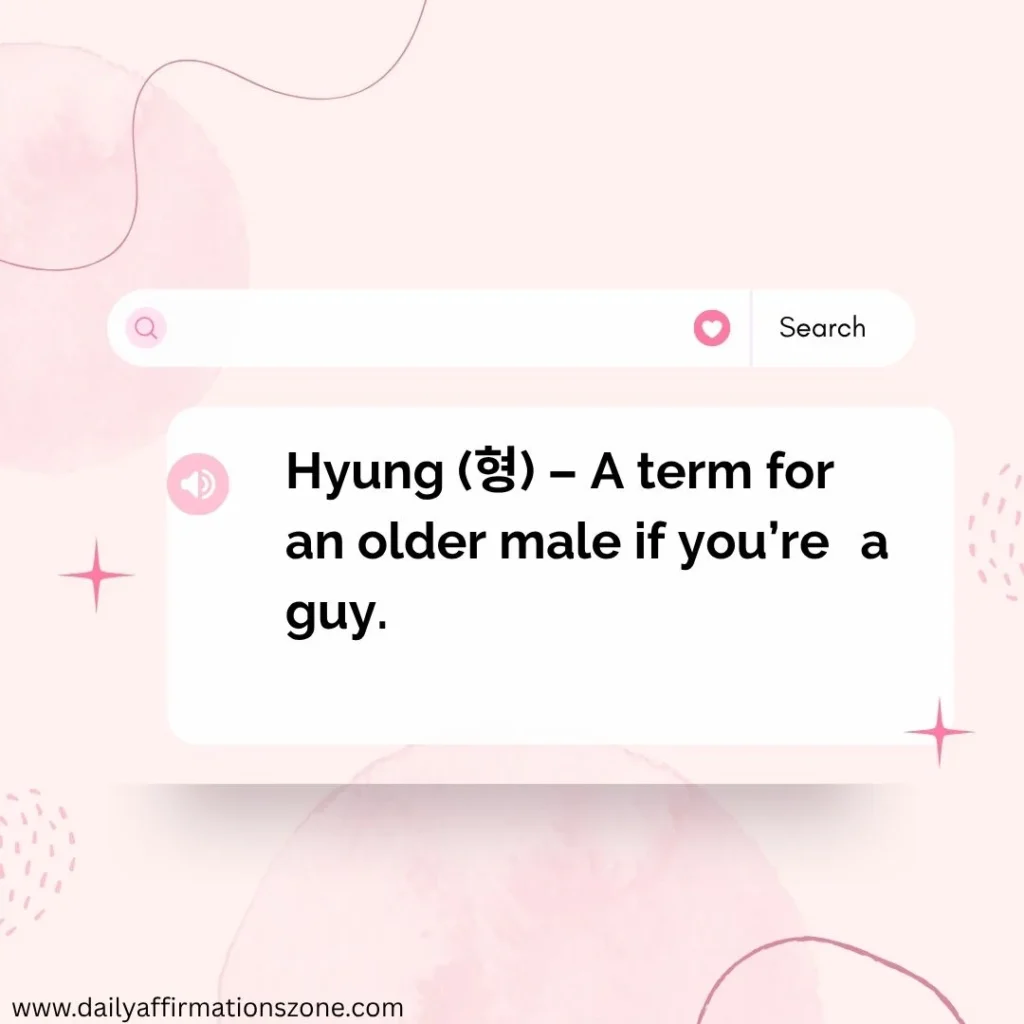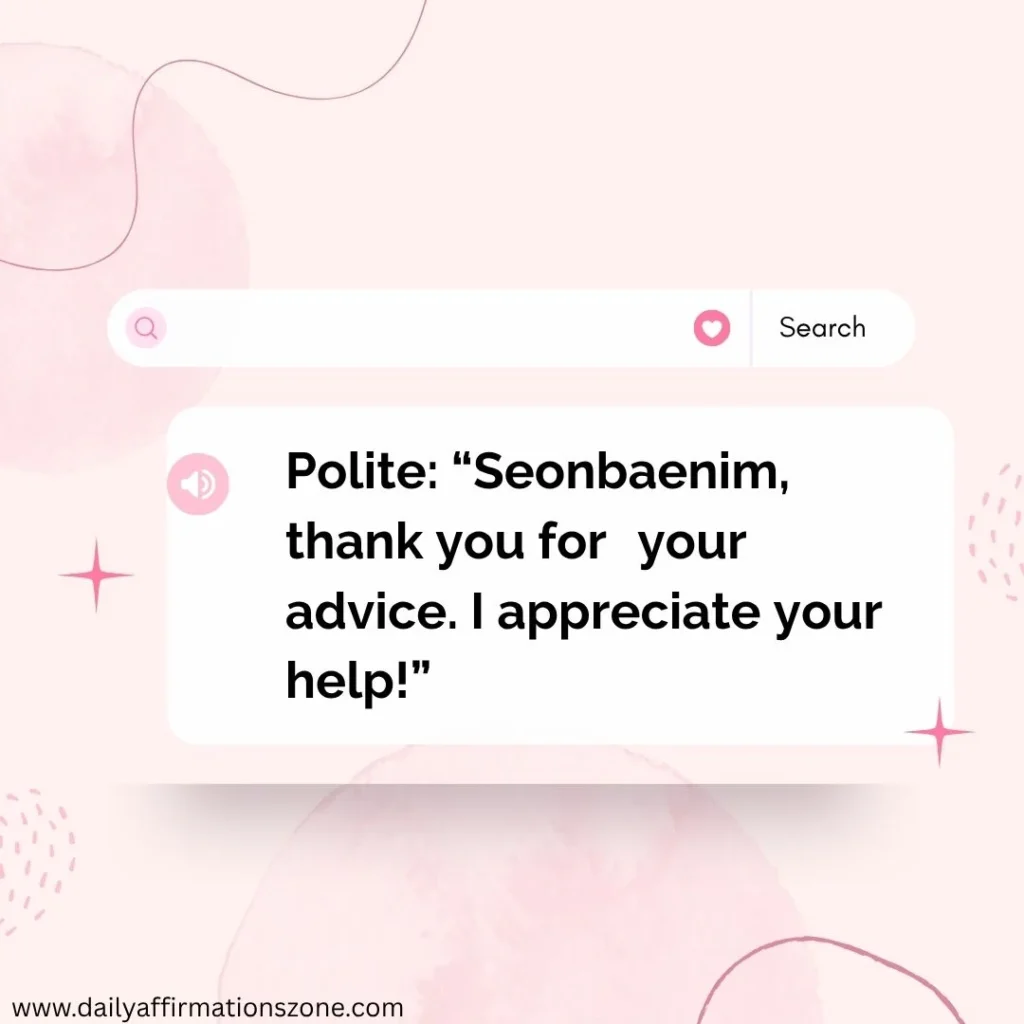Oppa meaning: Knowing the nuances of “oppa” but also other words can help expats manoeuvre successfully in various social settings. Whether you’re in a professional context, a more personal context, or dating, selecting the correct term will guarantee that there’s no miscommunication and will also demonstrate cultural sensitivity. Through these options, you can make sure that you’re expressing warm, respectful, or affectionate feelings in a way that fits the situation
The word lacks English equivalent, but is based on many aspects of Korean culture which has been adopted by the world, particularly K-pop and K-dramas.
Although it is generally interpreted to mean “older brother,” it is used here in a broader context than literal kinship.
Read this post it will approach the meaning of “oppa,” its significance in culture, and several other alternatives depending on different situations such as respectful/ professional/ or casual manners of speaking to someone.
What Does Oppa Mean?
“Oppa” is a Korean word that is used by younger females to call even older men; the older male could be a literal brother or it could be just a close male friend. But, its significance is not identical, it changes depending on who is talking to whom and so on.

Mostly due to the enormous popularity of K-pop, K-dramas, and Korean culture in general, the Korean term “oppa,” (오빠), has crossed linguistic barriers to become among the most recognizable Korean words used worldwide. Beneath its apparently straightforward surface, though, is a complicated network of cultural meanings, social dynamics, and shifting use patterns that will still impact human communication across societies in 2025.
Different Uses of “Oppa”:
- Family Context 1: A younger so sibling is addressing her older brother as “oppa.”
- Context: (In a friendship) It can be used how a younger female friend refers to an older male friend by calling him “oppa”.
- Romantic Context: In love relationships, “oppa” may also be used instead of using your boyfriend’s or husband’s first name.
- Casual Flirting: Some women (mostly in K-dramas and pop culture) use it to describe a man, likely to whom she’s attracted, and may refer to him as “oppa” flirtatiously.
The Traditional Definition of Oppa
“Oppa” is essentially a Korean honorific term that English converts as “older brother.” Women have traditionally addressed older men—blood brothers, male cousins, or older male friends and colleagues. The word honors the strongly rooted age hierarchy in Korean society, in which social contacts and communication style are determined by age.
Emphasizing respect for elderly and the requirement of maintaining suitable social order, the use of “oppa” reflects the Confucian ideas that have always shaped Korean society. Younger daughters honoring an older guy “oppa” are not just displaying a relationship but also respecting his senior position.
Cultural Context and Social Hierarchy
The meaning of “oppa” is also dependent on an understanding of the larger South Korean social hierarchy and honorific language. Korean society is built on an age-based hierarchy that can dictate how individuals behave, relationship-wise, even the difference of a year provides structure to it all. This order is mirrored in the manner of speaking when ‘you’ are addressed: formality at multiple levels and separate terms depending on the relationship.
“Oppa” is only a small part of a family of relationship-specific honorifics within this kind of framework. “Hyung” (형) is used by males to address older males, “noona” (누나) is used by males to address older females, and “unnie” (언니) is used by females to address older females. All have their cultural connotations and correct usage.
There is a general affection and respect from a younger sister to an “oppa” (traditional Korean term for an older guy) with a dose of protection or guidance that may or may not be expected. The elder brother frequently appeared as the ruler and protector, while the younger sister pays her respects and obeisance in her use of address.
The Significance of “Oppa” Throughout Korean Culture
In Korean society, “oppa” describes an older brother or close older male used by younger women. Beyond ties to family, it shows affection, respect, and emotional connection. “Oppa” in K-pop and dramas indicates warmth and safety since it captures respect and love. Its wide use highlights in Korean society great values of hierarchy, gender roles, and social interaction.
Korea is a hierarchical society and it will affect your day to day interactions with others. You’re giving an “oppa” to a male friend to whom you are close friends with and respects him as elder. Although you should also make use of it properly since it might be rude or too much in your face to use in every situation.
Read Hoda Meaning : Origins, Symbolism, and Cultural Significance 2025
Other Versions of “Oppa” Depending on Situation
Here are some alternatives to “Oppa” in Korean, which may be used by Koreans – depending on the context and the relationship:

- Hyung (형) – A term for an older male if you’re a guy.
- Noona (누나) \– An expression used by younger males toward older females.
- Unnie (언니) -Used by younger females to older females.
- Sunbae (선배) – For upperclassmen at school or seniors at work.
- 아저씨 (Ahjussi) – For middle aged men, not your kin.
- Ah oppa~ – A cuter or more flirtier variation which is used in a playful or loving way.
- Name + Oppa – Can be personalized, e.g., Minho Oppa; nickname for older, close or beloved friend.
It depends on age, gender, proximity, social situations, and so forth.
Additionally, depending on the situation, there are plenty of polite, professional, and casual variations to “oppa.”
1.Formal Alternatives
If you’re in a professional environment or speaking to someone you don’t know that well, then here are some options:
- Noona/Nuna (누나): For an older female colleague or mentor. Seonbae (선배): For an older colleague or mentor.
- Sunbaenim (선배니미) – A more respectful form of “seonbae“.
- Sir/Mr. [Last Name]: For a global context, Sir or Mr. [last name] is acceptable.
- Hyeong (형): If a younger male is speaking to an older male, they use “hyeong” instead of “oppa.”
2.Casual Alternatives
For casual talks with friends or acquaintances:
- Hyung (형) (Males): Used among close male friends.
- Bro/Dude-: Like Western English colloquial interjections.
- Big Bro: It is a fun way to call a male friend who is older than you.
- Boss: (casual) You kin joke and call a older man “boss.
3.Romantic Alternatives
For relationships, here are different alternatives to “oppa”:
- Honey/Darling/Babe: Popular English endearing words.
- Jagiya (자기야): A casual endearing term in Korean, like “honey.”
- My Love: A sweet and overall great form of endearment.
- Prince/King: A cheeky term for a significant other.
4.Fun and Flirty Options
If you are using ”oppa” in a cute or flirtatious way, consider these:
Cutie: This is a cute name to use.
Sugar: Sweet way to express affection.
Baby Boy: A playful nickname.
Heartthrob: If a famous person or crush.
Charmer: Emphasizes another person’s flirtatious qualities.
What to Look for in an Alternative
There is no rule for deciding, it depends on:
- Relationship: Are you speaking to family, friends or a romantic partner?
- Formality: Are conditions professional, casual or playful?
- Cultural Sensitivity; If talking to a korean, mind your manners.
- Tone and Intent: Keep the peace by being a pal, not too formal or familiar.
Texting Oppa Meaning and Alternatives Examples
Examples

Text messages examples in real life how to use alternatives to “oppa” well:
- Polite: “Seonbaenim, thank you for your advice. I appreciate your help!”
- Friendly: “Hey big bro are we still on for dinner tonight.”
- Casual: “Bro, you need to check out this K-drama!”
- Romantic: “Goodnight, jagiya. Sweet dreams!”
- Playful: “Aww, sugar, you know just how to make me grin!”
- Polite: “Yes, sir, the report will be ready by tomorrow.”
- Flirty: “Heartthrob, you free this weekend?”
- Siblings: “Oppa, please, help me with my homework.”
- K-Pop Fan: ”The love of my life is definitely Jin from BTS!”
- Cheeky: “Hey boss, you lookin’ good today!”
The K-Pop and Hallyu Wave Impact
The international distribution of Korean culture, referred to as Hallyu or the Korean Wave, has since influenced the way in which “oppa” is recognized and applied internationally. K-pop idols are stripped of their identities and remade as “oppa,” and this sex-objectification is wrapped in a cute kind of boyish innocence, and is then packaged to sell dreams, to sell products, to sell tickets to fan events, cultivation the impression that an oppa will be a lady’s perfect protector.
“Oppas” is a term used by international K-pop fans to express love for their male idols. This use has therefore added a novel layer to the definition of the term, as a sphere connecting cultures, and a method for international fans to engaged in expressions of Korean culture. But this highjacking has also sparked discussion around cultural sensitivity and a correct interpretation of the term’s meaning.
There are certain definitions of “oppa” that has been spread over the entertainment sector. In K-dramas, we have all seen male and female leads share a romantic relationship where the female lead sweetly addresses the male protagonist as “oppa.” It’s a side of the word that has evolved through culture as one of romantic love. This representation had impact on the way the word has been apprehended and used especially by international audiences even when it has been, sometimes, removed from its original family-related dimension.
Read Mamushi Meaning In Japanese: How It’s Used Today In 2025
Modern Usage and Evolution
With the globalization of Korean culture and the far-reaching changes in Korean society, the use of “oppa” has been more diversified and Bathed in our Korean culture “oppa” portrayal of the changes taking place today. In modern Korea, it is also commonly used each other between people who are not engaged in a family relationship, indicating different meaning and intimacy by each case.
“For Korean youth, ‘oppa’ can also be said in a joking, and even flirtatious way amongst friends, which was traditionally not the case for the term. This shift mirrors broader changes in Korean society, where traditional hierarchies are being challenged and where relationships — particularly between the sexes — are becoming more equal, even while the basic respect for age hierarchy remains securely in place.
The digital age has also changed the way “oppa” is used since social media platforms and online communities provide additional contexts. Supporters use it in comments, hashtags and fan fiction, and the community of users it connects is global, even though their individual understandings of the term’s cultural significance may look nothing alike.
Dialects and Regional Variations
As with most Korean words, however, “oppa” can have a slightly different pronunciation, and usage may differ, according to regional dialect and local custom. Standard pronunciation is that of Seoul but slight pronunciation differences in certain regions of Korea are explained or even how the term is used in actual daily life.
As if that weren’t complicated enough, the use of the word “oppa” differs greatly depending on where someone is from and the local culture of that place, adding additional nuance to the meaning of the word. For language learners and culture geeks, it is always interesting to pay an attention to these differences for a more well-rounded understanding of Korean linguistic diversity.
Read Amish Oil Change Meaning: A Viral internet sensation in 2025
Alternatives and Relatives
To explain “oppa,” you also need to know its alternatives and related terms that function similarly in different situations. For those who want to convey those same feelings without resorting to “oppa,” there are a few ways to accomplish that in the Korean language and culture.
“hyung” if you are referring to an older male, while “sunbae” (선배) works to refer to someone that is older than you (male or female), someone you work with in a company, or the likes. “Ahjussi” (아저씨) is applied to middle-aged men, but it has an even more remote and formal feel than “oppa.”
romantic relationships i think you mean darling - a korean equivalent would be ‘jagiya’ (자기야) the word ‘oppa’ denotes the male as older role in a relationship; a word like ‘yeobo’ (여보) normally used by married couples or ‘jagiya’ for a younger relationship may be a better fit based on what you’ve described as the dynamic of the relationship.
For foreign speakers who wish to be respectful without appropriating Korean words, knowing about the respect and endearment “oppa” signifies allows them to come up with an equivalent of their native tongue as they wish that could contain the same exact meaning.
Cultural Relevance & Usage Respect
The worldwide success of “oppa” has been well-pondered conversation about cultural appropriation and the appropriateness of adopting words from other languages and cultures. The art of knowing how, and when, it is appropriate to use “oppa” is more than knowing the literal translation; it’s about understanding the cultural significance and the social relationships that come with the term.
For those of us who are not fluent in Korean, “oppa” comes with the pressure of both comprehending its cultural significance and not taking it lightly. That includes understanding that the word has various layers of meaning beyond just being a casual form of address, containing elements of respect, hierarchy and relationships that are of paramount importance in Korean society.
Education programs and cultural exchange have been of particular significance in 2025 to promote a correct understanding of the word Korean word “oppa,” for example. These are programs that promote understanding of the depth, richness and nuanced beauty, of the Korean language and culture, for our international audiences; teaching them about cross-culture communications that are respectful.
Read OTP Meaning : A detailed explanation for OTP definition in 2025
Transnational ”Oppa” in Global K-pop Culture
And as we progress through 2025, “oppa” takes on new dimensions in world culture. In fact the word is an interesting case study in terms of how words jump from culture to culture and take on new meaning while still retaining some of their original sense.
Countries that aren’t Korea will also continue to define what it means for someone to be an “oppa” abroad, with social media and streaming services and more cultural exchange likely to continue to play into its understanding and usage internationally. “How do we keep respect for the cultural roots of the term and also allow for language to flow and for different cultures to borrow?”
Education, cultural sensitivity training and ongoing dialogue between Korean and international communities will have an important part to play in making sure the global use of “oppa” remains respectful and informed. This increasingly tense conversation is a reflection of deeper issues in our interconnected world, of what it means to share and respect cultural products over linguistic and national divides.
Conclusion
The term “oppa” means so much more than older brother in Korean. As the strange relationship unfolds they reveal various cultural values, social rankings, and relationship modes unique to Korea at the same time presented in both traditional Korean and globalized world culture. Definitions of “oppa” in 2025 Knowing what oppa means in 2025 means understanding its origins, but also recognising how globalisation and cultural exchange have given it new meanings and contexts.
For anyone with an interest in Korean culture, whether it be for K-drama-loving, Korean-language studying, or Korean-friend-making purposes, using “oppa” with cultural consideration and cultural understanding can facilitate smooth and successful cross-cultural communication and display respect for the deep well of linguistic heritage it has emerged from. As Korean culture becomes increasingly influential on the international stage, so do words and phrases like “oppa” become cultural connections and windows to understanding each other across languages, when used with respect and thoughtfulness.
The continued mutation of “oppa” in global culture is a vivid reminder that our connected world continues to engage in an active and sometimes uneasy negotiation of preservation and adaptation of cultural traditions. In the words, we can see the complexity and the beauty of language and culture hopping across national frontiers while keeping its kernel of meaning, its cultural values.








